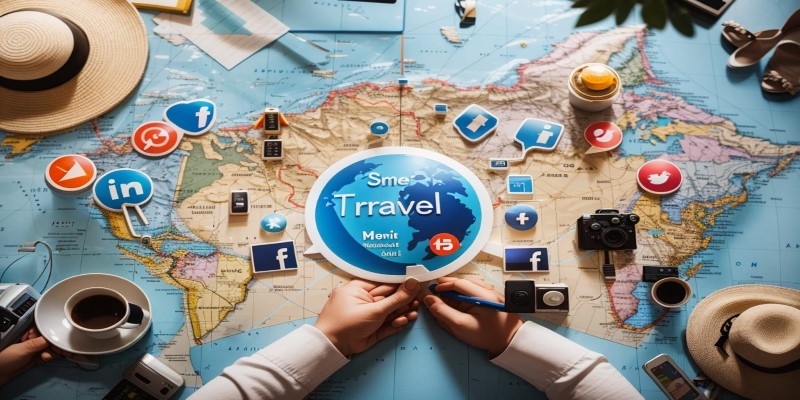
Top 5 Travel Trends Shaping The Industry In 2025
 Travel
Travel The travel industry is on the cusp of significant change. As we look ahead to 2025, several trends are emerging that will influence how people travel, where they go, and what they expect from their experiences. These trends reflect a shift in consumer preferences, technological advancements, and a growing awareness of the impact that travel has on the environment and society. For travelers and businesses alike, staying in tune with these changes is key to staying relevant in the evolving market.
The travel industry is on the cusp of significant change. As we look ahead to 2025, several trends are emerging that will influence how people travel, where they go, and what they expect from their experiences. These trends reflect a shift in consumer preferences, technological advancements, and a growing awareness of the impact that travel has on the environment and society. For travelers and businesses alike, staying in tune with these changes is key to staying relevant in the evolving market.
1. The Growing Demand For Sustainable Travel
Sustainability is no longer just a buzzword; it’s becoming a key driver in travel decisions. As more people become conscious of climate change and its effects, there’s a noticeable shift towards more eco-friendly travel options. By 2025, this trend will be in full force, with travelers increasingly prioritizing sustainability over convenience or price. From selecting eco-conscious accommodations to opting for low-emission transportation like electric cars and high-speed trains, sustainability will guide many travel choices.

Hotels and airlines are responding to this demand. Many hotels are introducing green certifications, energy-efficient technologies, and waste-reduction programs to cater to environmentally conscious guests. Airlines are making strides in reducing carbon emissions by using sustainable aviation fuel and implementing carbon offset programs. More destinations are also focusing on sustainability, protecting natural landmarks, and preserving local cultures, giving travelers the opportunity to experience more responsible tourism. In 2025, travelers will expect businesses to take a proactive role in environmental stewardship and will be more willing to pay a premium for services that reflect these values.
2. The Integration Of Technology In Every Step Of Travel
Technology will play a pivotal role in shaping the travel landscape by 2025. Innovations like artificial intelligence (AI), virtual reality (VR), and biometric recognition will revolutionize the way people plan, book, and experience their trips. AI will enhance personalization, helping travelers find tailored recommendations based on their preferences and previous trips. Whether it’s choosing a destination, finding the best restaurant, or booking activities, AI will simplify and optimize the decision-making process.

Virtual reality (VR) will allow potential travelers to virtually visit destinations before booking, enabling them to make more informed choices. For example, a person interested in visiting a particular hotel or cultural site might be able to take a VR tour before committing to the trip. This can significantly enhance destination marketing efforts and attract more visitors.
3. Solo And Micro-Group Travel Gaining Popularity
Solo travel and micro-group tourism are expected to grow rapidly in 2025. For many people, the idea of traveling alone or with just a small group of friends or family offers a greater sense of freedom and flexibility. Solo travelers, particularly younger generations, are increasingly seeking unique experiences that allow for self-reflection, personal growth, and exploration. This trend has already been gaining traction, and by 2025, it will be a mainstream choice for many looking to travel on their terms.

Micro-group travel—small groups of up to 10 people—is also gaining popularity. These smaller groups offer a more intimate and personalized experience, allowing travelers to enjoy tailored itineraries and bespoke services. The rise of specialized small-group tours and private experiences means travelers can access deeper cultural and local connections, often in ways that larger groups cannot. Whether it’s a private wine-tasting in Bordeaux or an intimate cooking class in Tuscany, micro-group travel offers flexibility and a sense of exclusivity.
4. Workations And Remote Work Travel
Remote work is here to stay, and so is the rise of workstations—combining business and leisure travel. More and more people are opting to work from different locations while still meeting their professional responsibilities. By 2025, the concept of a workstation will be fully integrated into the mainstream travel experience. For digital nomads, entrepreneurs, and remote employees, the freedom to work from anywhere in the world has opened up new opportunities to explore destinations that might have otherwise been off-limits.

Countries and cities that cater to this trend are offering specialized packages that include everything from high-speed internet to co-working spaces and accommodation for long stays. These "remote work hubs" are designed to allow professionals to maintain their productivity while enjoying a change of scenery. Popular destinations like Bali, Lisbon, and Mexico City are already attracting remote workers, and this trend will only grow in the coming years.
5. The Future Of Travel In 2025
In 2025, travel will be shaped by a mix of technological advancements, a focus on sustainability, and a deep desire for more personalized and meaningful experiences. Travelers will increasingly seek responsible and sustainable travel options while at the same time embracing the possibilities that new technologies provide. The integration of AI, VR, and biometric technology will make travel more seamless and customized, while trends like solo and micro-group travel will redefine how people approach vacations.

As the industry evolves, travel businesses will need to adapt quickly to meet these changing demands. Companies that fail to embrace sustainability, new technologies, and the increasing desire for personalized experiences will find themselves lagging behind. Conversely, businesses that can innovate and align with these trends will thrive in an increasingly competitive environment.
A New Era Of Travel
Looking ahead, the travel trends in 2025 will create a dynamic, ever-changing landscape. As travelers become more conscious of their environmental impact, they will seek out experiences that are not only exciting and enriching but also responsible and sustainable. Technology will continue to transform how we plan and experience travel, and the rise of solo and micro-group travel will cater to a new generation of explorers looking for unique and meaningful journeys.
In the coming years, the travel industry will be defined by its ability to adapt to these shifting preferences, blending innovation with responsibility to create a travel experience that resonates with today’s conscientious and tech-savvy consumers. For travelers and businesses alike, 2025 promises to be an exciting year of transformation and new opportunities. Hope you found this info worth reading. Stay tuned for more!
